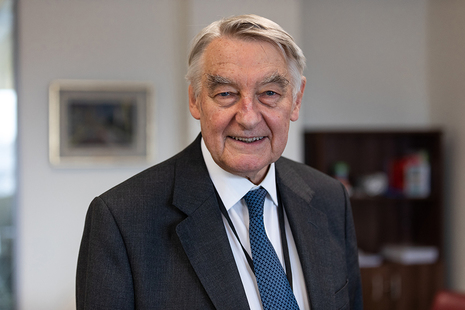The tribute made by Christopher Bellamy, Baron Bellamy, in the House of Lords on 10 September 2022.
My Lords, when I had the great honour to be introduced in this House on 14 June this year, little did I imagine that mine would be the very last Letters Patent to be issued by Her late Majesty in connection with a government appointment. Two more distinguished Cross-Benchers—more distinguished than I—were created in June and July, but I believe that I am the most junior Member of this House to make my humble tribute.
Like some others of your Lordships, I have a clear memory of the day that Her late Majesty came to the Throne. When my father picked me up, aged five, from school to say that the King had died, it was clear that he was very deeply affected, even in those days of the stiff upper lip. For that generation, the premature death of their shy but steadfast sovereign who had led them through so much was perhaps even more dreadful. At least we now know how they must have felt. With her adored father as a central inspiration, Her late Majesty was able to build much more widely on his example.
Much has rightly been made of the Commonwealth and, as the noble Lord, Lord Alton, has just referred to, Her Majesty made her famous declaration in 1947 where she pledged her service. It is perhaps worth noting that what she pledged to serve was “our … imperial family”. At that time, on her 21st birthday, only four countries of the then empire—the old dominions—were de facto, if not technically de jure, independent, although India and Pakistan achieved dominion status very shortly thereafter. What we have since seen, as has been mentioned already, particularly by the noble Lord, Lord Addington, is a transformation utterly unique in history from an imperial family to a family of 56 independent nations in voluntary association not only with the former imperial power but with each other and their former imperial sovereign.
As during her reign the imperial power waned and eventually vanished altogether, together with the imperial idea, so Her Majesty’s moral stature rose in almost inverse proportion. That tells us something about the nature of true power and the strength of eternal human value. While some regimes may prefer grandiose display, Her Majesty very much had the common touch. Almost everyone she ever met, and many who she never met, from whatever station in life, instinctively felt that she was on their side.
For me and, I would hope, most of this nation, the self-deprecating, understated humour of the marmalade sandwich is surely the most powerful statement of human values, even if a subtle statement, that any monarch could ever make. Her whole life represented an effective answer to aggression and intolerance everywhere. I am sure that His Majesty the King will follow that example. Long live the King.
